Trending Now
We have updated our Privacy Policy and Terms of Use for Eurasia Group and its affiliates, including GZERO Media, to clarify the types of data we collect, how we collect it, how we use data and with whom we share data. By using our website you consent to our Terms and Conditions and Privacy Policy, including the transfer of your personal data to the United States from your country of residence, and our use of cookies described in our Cookie Policy.
{{ subpage.title }}
Biden's mistakes in Afghanistan were not "dereliction of duty"
In his latest Washington Post op-ed, Marc Thiessen makes strong statements about how and why the Taliban came to take control of Kabul. There have been big mistakes in executing this exit. But "dereliction of duty?" Not in our view. Ian Bremmer and Eurasia Group analyst Charles Dunst explain why in this edition of The Red Pen.
Today we're taking our Red Pen to a recent op-ed from the Washington Post written by Marc Thiessen, a Post columnist, American Enterprise Institute fellow, and former speechwriter for President George W. Bush. It's titled, "Greenlighting the Taliban's takeover of Kabul is a national disgrace," and makes some strong statements about how and why the Taliban came to take control of Afghanistan's capital city. I want to unpack some of his arguments for you and explain why we disagree. So, let's get out the Red Pen.
First, Thiessen argues that "all the horrors the world witnessed over the past two weeks…might have been prevented" had the United States opted to take over Kabul, rather than letting the Taliban do so.
Let's remember: "The enemy gets a vote." Thiessen is comparing the real world, with all of its unpredictability, to a counterfactual one where everything goes according to (his) plan. Even if the horrors he cited had been averted, wouldn't others have unfolded? Putting thousands of Americans back on Kabul's streets would have meant putting them in the crosshairs of terrorist groups like ISIS-K. Do we believe these groups wouldn't have targeted Americans in Kabul with suicide bombings, like the recent airport attack, or even engage them in firefights? Biden had to decide between two unpalatable options. He chose the one he believed would put the fewest Americans in harm's way.
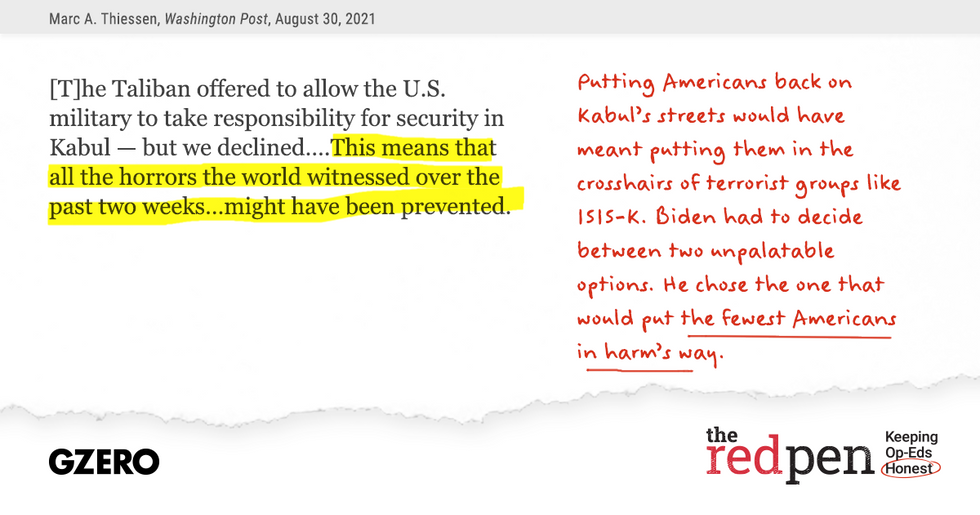
Next, Thiessen cites a former American senior general officer to argue that the "US military could definitely have secured the capital"––at least the green zone where Western embassies are located, plus access to the airport.
For starters, Thiessen bases his argument on the views of one "former senior general officer" whose identity we don't know. How widely shared are those views among current military officials? If the 20-year war has taught us anything, it should be some caution before arguing the United States could secure a city of over six million people indefinitely with a few thousand troops. Before leaving office, the Trump administration brought US troop numbers in Afghanistan to just 2,500, a 19-year low. By the end of July 2021, only 650 remained. Taking over Kabul would've required something politically incredibly challenging: a substantial troop surge that would've put more Americans in danger. Thiessen doesn't explicitly call for a surge, but the upshot of his critique is clear enough. There's an argument for a surge (even if politically very unpopular), he should tell us how many additional troops we would have to send in and for how long to hold onto a city the United States had already lost.
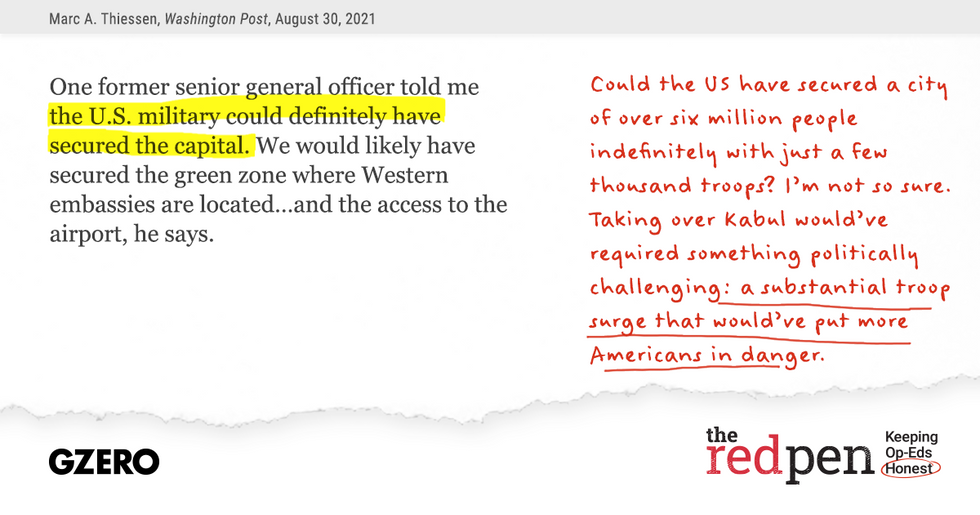
Thiessen also calls the Biden administration's decision to "cede" Kabul to the Taliban "a dereliction of duty unlike any we have seen in modern times."
Keep in mind it was Trump, not Biden, who went over the Afghan government's head back in February 2020 to negotiate with the Taliban and agree to remove all US troops from the country. There were US political considerations for doing so, I get it. But from that point, the Taliban's takeover of Kabul had, at that point, become a foregone conclusion
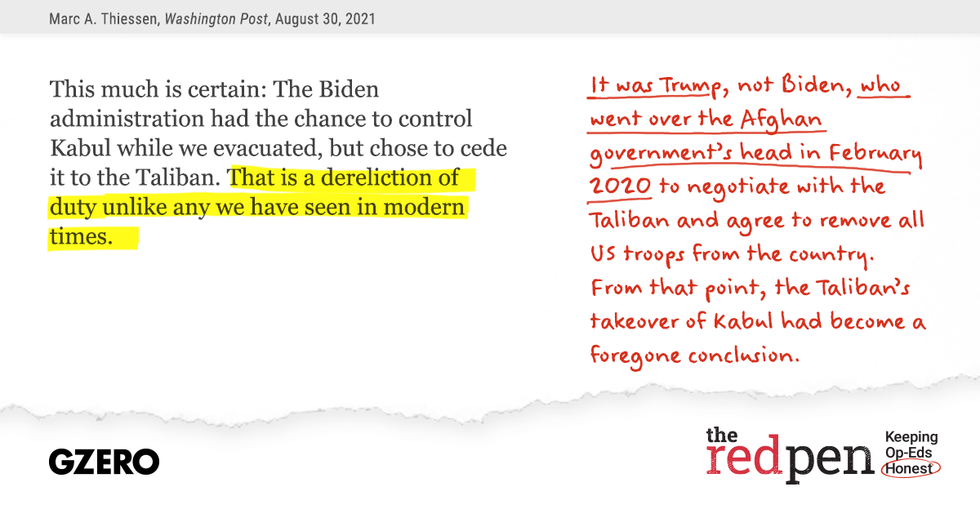
Next point: Thiessen writes that the administration's withdrawal "put the safety of American civilians, service members and Afghan allies in the hands of terrorists" — referring to the Taliban — "rather than the U.S. armed forces" and "led directly to the deaths of 13 Americans in an Islamic State attack on the Kabul airport."
Earlier, though, he almost presents the Taliban as an organization whose word General McKenzie should've trusted: "[T]he Taliban offered to allow the US military to take responsibility for security in Kabul — but we declined." What makes him believe a terrorist organization intent on retaking power would honor a pledge to allow US forces to secure the capital city? Which Taliban is it?
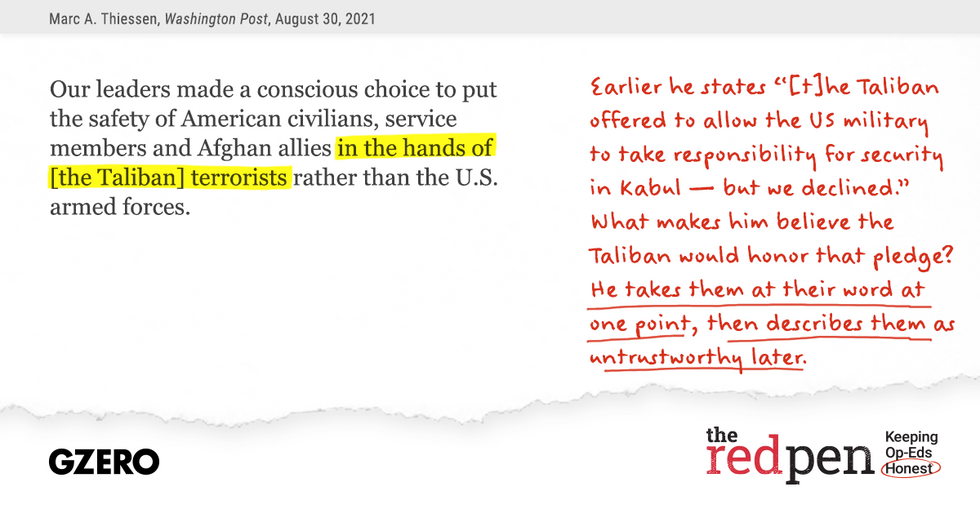
Finally, Thiessen concludes by arguing that Biden's decision to let the Taliban take over Kabul "led directly to the deaths of 13 Americans in an Islamic State attack on the Kabul airport."
Harrowing as the images coming out of Afghanistan are, Biden had decided to not risk even more US lives in the war's twilight. Staying at the airport and trying to hold onto Kabul for a few more weeks would have helped the United States evacuate more Afghan partners, but it would also have risked the lives of thousands of US soldiers.
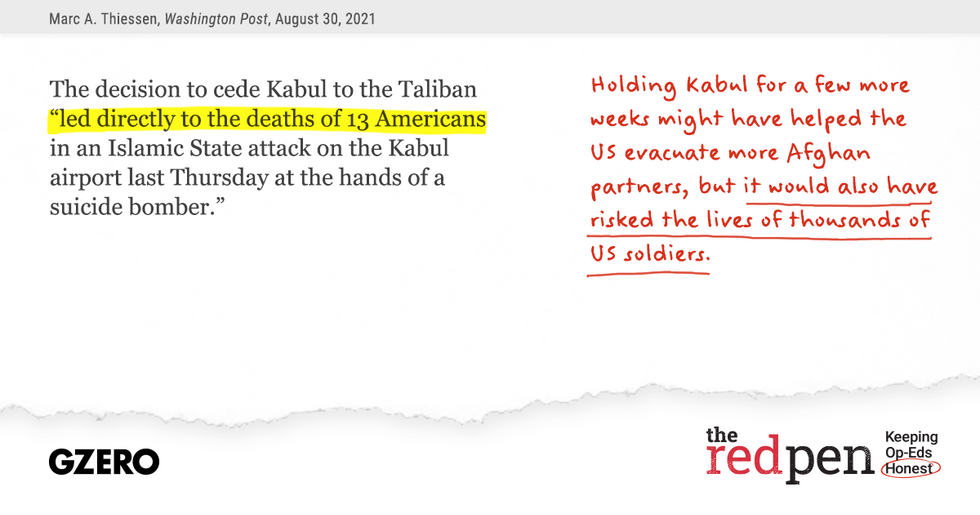
One thing I think many of us agree on — this has been a sad and embarrassing ending to the 20-year war in Afghanistan. We've left countless Afghan allies behind, despite promising them safe passage. August's events will no doubt cast an added shadow of grief over the coming anniversary of the 9/11 attacks. The Biden team certainly made mistakes in executing this exit. But "dereliction of duty?" No, not in my view.
- Afghanistan: Four key failures - GZERO Media ›
- Can Biden recover from his Afghanistan debacle? - GZERO Media ›
- The US couldn't have won in Afghanistan - but Biden's mistakes lost ... ›
- Biden's speech on Afghanistan ignores serious failures; Afghan ... ›
- Calamitous withdrawal from Afghanistan was a crisis of Biden’s own making - GZERO Media ›
